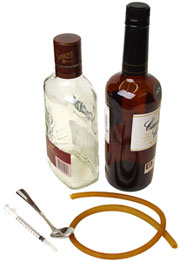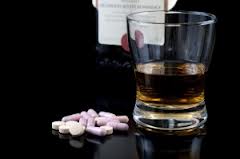Is Alcohol More Dangerous Than Heroin?
Heroin is clearly a dangerous drug. It carries a certain stigma because it is illegal. And no doubt, deadly. But what about alcohol? It, too, is a drug but, it is legal. Does that mean that alcohol is any safer than other drugs like heroin?
The World Health Organization estimates that risks linked to alcohol cause 2.5 million deaths a year from heart and liver disease, road accidents, suicides and cancer — accounting for 3.8 percent of all deaths. It is the third leading risk factor for premature death and disabilities worldwide.
Let’s take a look at the effects of alcohol and heroin, respectively on both the user’s brain and physical body to see how they compare.
Alcohol Effects on the Body
Heart: Alcohol is more dangerous than heroin because it can have serious effects on physical health. And it is not just from drinking a lot over a long time; drinking too much on a single occasion can damage the heart and cause problems such as cardiomyopathy (stretching and drooping of heart muscle); arrhythmia – (irregular heart beat); stroke; high blood pressure.
Liver: Alcohol is more dangerous than heroin because heavy drinking takes a toll on the liver, which leads to a variety of problems such as fatty liver, alcoholic hepatitis, fibrosis, and cirrhosis.
Pancreas: Alcohol is more dangerous than heroin because it causes the pancreas to produce toxic substances that can eventually lead to pancreatitis, dangerous inflammation and swelling that prevents proper digestion. This can lead to malnutrition and therefore affecting brain function.
Cancer: Drinking too much makes alcohol more dangerous than heroin because it increases your risk of developing certain cancers, including cancers of the mouth, esophagus, throat, liver, and breast.
Immune System: Drinking too much can weaken your immune system, making your body more susceptible to disease. Chronic drinkers are more likely to contract diseases than people who do not drink too much. Drinking a lot on a single occasion reduces the body’s ability to fight off infections, even up to 24 hours after getting drunk.
Alcohol Effects on the Brain
Looking at the effects on the brain from long-term drinking, it is clear: alcohol is more dangerous than heroin. Extended alcohol consumption can lead to something known as “wet brain.” It is a chronic and debilitating syndrome characterized by persistent learning and memory problems. Patients are forgetful and easily frustrated. They experience difficulty with walking and coordination. Although these patients have problems recalling old information, it is their difficulty in forming new information that is the most striking.
People may not be aware that prolonged liver dysfunction can harm the brain, leading to a serious and potentially fatal brain disorder known as hepatic encephalopathy, which causes changes in sleep patterns, mood, and personality; anxiety and depression; severe cognitive effects such as shortened attention span; and problems with coordination. Alcohol–damaged liver cells allow excess amounts of these harmful byproducts to enter the brain, thus harming brain cells.
Heroin Effects on the Body
Chronic users may develop collapsed veins, infection of the heart lining and valves, abscesses, constipation and gastrointestinal cramping, and liver or kidney disease. Pulmonary complications, including various types of pneumonia, may result from the poor health of the user as well as from heroin’s effects on breathing.
In addition to the effects of the drug itself, street heroin often contains toxic contaminants or additives that can clog blood vessels leading to the lungs, liver, kidneys, or brain, causing permanent damage to vital organs.
Heroin Effects on the Brain
Regular heroin use changes the functioning of the brain. One result is tolerance, in which more of the drug is needed to achieve the same intensity of effect. Another result is dependence, characterized by the need to continue use of the drug to avoid withdrawal symptoms.
Withdrawal Syndrome: Alcohol vs Heroin
Another indication as to the danger of alcohol is its associated withdrawal syndrome. When an alcohol-dependent person suddenly stop drinking, they are subject to many serious symptoms that can even lead to death. Heroin withdrawal, on the other hand, feels like you are dying but it isn’t actually fatal.
The MCDA Scale and Findings
In an effort to offer a guide to policy makers in health, policing, and social care, Professor David Nutt, chairman of Britain’s Independent Scientific Committee on Drugs (ISCD) and his team rated drugs using a technique called Multi-Criteria Decision Analysis (MCDA) which assessed damage according to nine criteria on harm to the user and seven criteria on harm to others.
Harms to the user included things such as drug-specific or drug-related death, damage to health, drug dependence and loss of relationships, while harms to others included crime, environmental damage, family conflict, international damage, economic cost, and damage to community cohesion.
Drugs were then scored out of 100, with 100 given to the most harmful drug and zero indicating no harm at all.
The scientists found alcohol was most harmful, with a score of 72, followed by heroin with a score of 55.
Therefore, their finding is that alcohol is more dangerous than heroin when the combined harms to the user and to others are assessed.
Sources:




